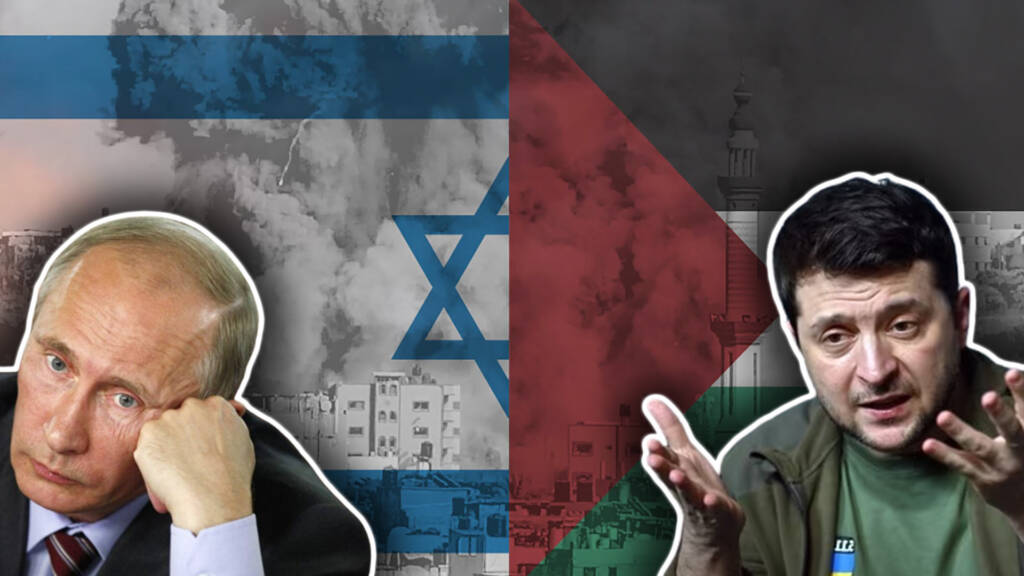In recent times, the West has often pointed fingers at Russia, painting Putin as the culprit in global issues. The latest accusation revolves around the Israel-Palestine conflict. However, these claims, including a report from Germany’s Bild newspaper, linking Putin to Hamas’ assault on Israel, lack substantial evidence. Despite accusations from various quarters, Israel has refuted any Russian involvement.
Germany links Putin to Hamas assault on Israel
Germany’s Bild newspaper recently raised eyebrows by connecting Russian President Vladimir Putin’s birthday to the escalation between Hamas and Israel. In an editorial titled ‘No more German money for these barbarians!’ written by Marion Horn, Chair of Bild’s editorial team, the bizarre link was made. The editorial referred to the recent attack coinciding with Putin’s birthday and the 50th anniversary of the Yom Kippur War. The Yom Kippur War, fought between Israel and Arab states in 1973, ended in an Israeli victory. While Putin indeed celebrated his 71st birthday, it remains unclear how this fact was relevant to the ongoing Middle East escalation. This odd connection highlights the complexity of media narratives in interpreting international conflicts.
Read More: Israel is Paying the Price of a Blunder Committed in 1994
Zelensky accuses Putin
Ukrainian President Volodymyr Zelensky, deeply troubled by Russia’s past invasion, recently accused Moscow of supporting Hamas. In an interview with France 2 television, Zelensky stated, “We are certain that Russia is supporting, in one way or another, Hamas operations.” He expressed concern that Russia’s actions were destabilizing global peace, emphasizing the need for international attention on the Ukraine crisis.
Historically close allies, Israel and Russia’s relations deteriorated after Russia’s invasion of Ukraine. Despite Israel’s attempts to balance ties with Moscow regarding Syrian airspace coordination, relations soured as Israel aided Ukraine and openly supported Kyiv. Zelensky defended Israel’s right to self-defense during Hamas’s surprise attacks, underlining its indisputable nature.
While acknowledging the tragedies in both Ukraine and Israel, Zelensky expressed worry that global focus on Israel’s crisis could divert attention from Ukraine’s ongoing war. Zelensky’s assertion suggested that Putin’s actions in Israel were a strategic move to divert NATO’s focus from Ukraine.
Russia’s stance on the Israel-Palestine war
Russia has called for an immediate cessation of hostilities between Palestine and Israel, emphasizing the need for diplomacy over violence. According to Russian Foreign Ministry spokeswoman Maria Zakharova, both parties should exercise restraint and engage in dialogue facilitated by the international community to achieve a lasting peace in the Middle East.
The recent escalation started with a surprise attack by Hamas from Gaza, breaching Israel’s border at multiple points and launching rockets into the country. The militants captured several locations in southern Israel and reportedly took Israeli soldiers and civilians as prisoners, as seen in online footage. In response, Israel conducted airstrikes in Gaza and mobilized military reservists. Israeli Prime Minister Benjamin Netanyahu declared the nation was at “war,” vowing severe consequences for the aggressors.
Russia’s stance emphasizes the importance of dialogue and peacebuilding, urging both sides to abandon violence.
Israel rubbishes claims of Russian involvement
Refuting those claims by the West, Israel’s ambassador to Moscow, Alexander Ben Zvi, vehemently dismissed claims connecting Russia to the recent Hamas attack. Allegations suggesting Russian involvement were labeled “complete nonsense” by Ben Zvi. Addressing the notion that the situation in Gaza benefits Moscow by diverting attention from Ukraine, he stated firmly, “We do not believe that Russia was involved in this in any way.”
Read More: Fatah Is Abandoning the Gaza Strip for West Bank’s Recognition
Ben Zvi emphasized the enduring partnership between the United States and Israel, asserting that the U.S. would continue supplying Israel with weapons despite the situation. He also refuted assertions that Hamas militants used Western-made weapons from Ukraine, citing a lack of evidence for such claims and indicating they originated from the Russian side. Ben Zvi’s comments underscored Israel’s confidence in Russia’s non-involvement in the conflict and emphasized the importance of factual, evidence-based discussions amid the ongoing tensions.
In the midst of these complex geopolitical dynamics, an intriguing perspective emerges: the United States, amid the Israel-Gaza conflict, seems to be strategically benefitting by supplying weapons to both sides. This paradoxical situation raises questions about the true interests at play in global conflicts. Moreover, the persisting attempts by the West, particularly in the portrayal of Russia as the universal culprit, appear increasingly ludicrous.
Watch More:
